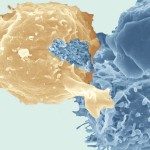Link to Pubmed [PMID] – 12752688
Immunol. Cell Biol. 2003 Jun;81(3):230-6
Over the past 7 years, West Nile zoonosis has been an emerging concern for public health in Europe, Middle East and more recently in North America. West Nile virus causes epidemic outbreaks in humans and infected patients may exhibit severe neurological symptoms. Because susceptibility and sensitivity to West Nile virus infections may depend on host genetic factors, a mouse model has been established to investigate the genetic determinism of host susceptibility to West Nile virus. A nonsense mutation in gene encoding the 1b isoform of the 2′-5’oligoadenylate synthetase (OAS1b) was constantly associated with the susceptibility of mouse strains to experimental West Nile virus infection. Oligoadenylate synthetase are interferon-inducible proteins playing a role in the endogeneous antiviral pathway. It was of interest to establish whether interferon-alpha and OAS 1B were sufficient to mediate resistance to West Nile virus infection. In the present study, we showed that interferon-alpha had the ability to modulate West Nile virus infection in mouse. In vitro, interferon-alpha protected mouse neuroblastoma cells against West Nile virus infection if cells have been pretreated with the cytokine for several hours. As a consequence of the presence of a stop codon, the Oas1b gene of the susceptible mice encodes a truncated and presumably inactive form, while resistant mice have a normal copy of the gene. Stable mouse neuroblastoma cell clones overexpressing mutant or wild-type OAS 1B were established. Replication of West Nile virus was less efficient in cells that produce the normal copy of OAS 1B as compared to those expressing the truncated form. Our data illustrate the notion that interferon-alpha and Oas genes may be critical for West Nile virus pathogenesis.



